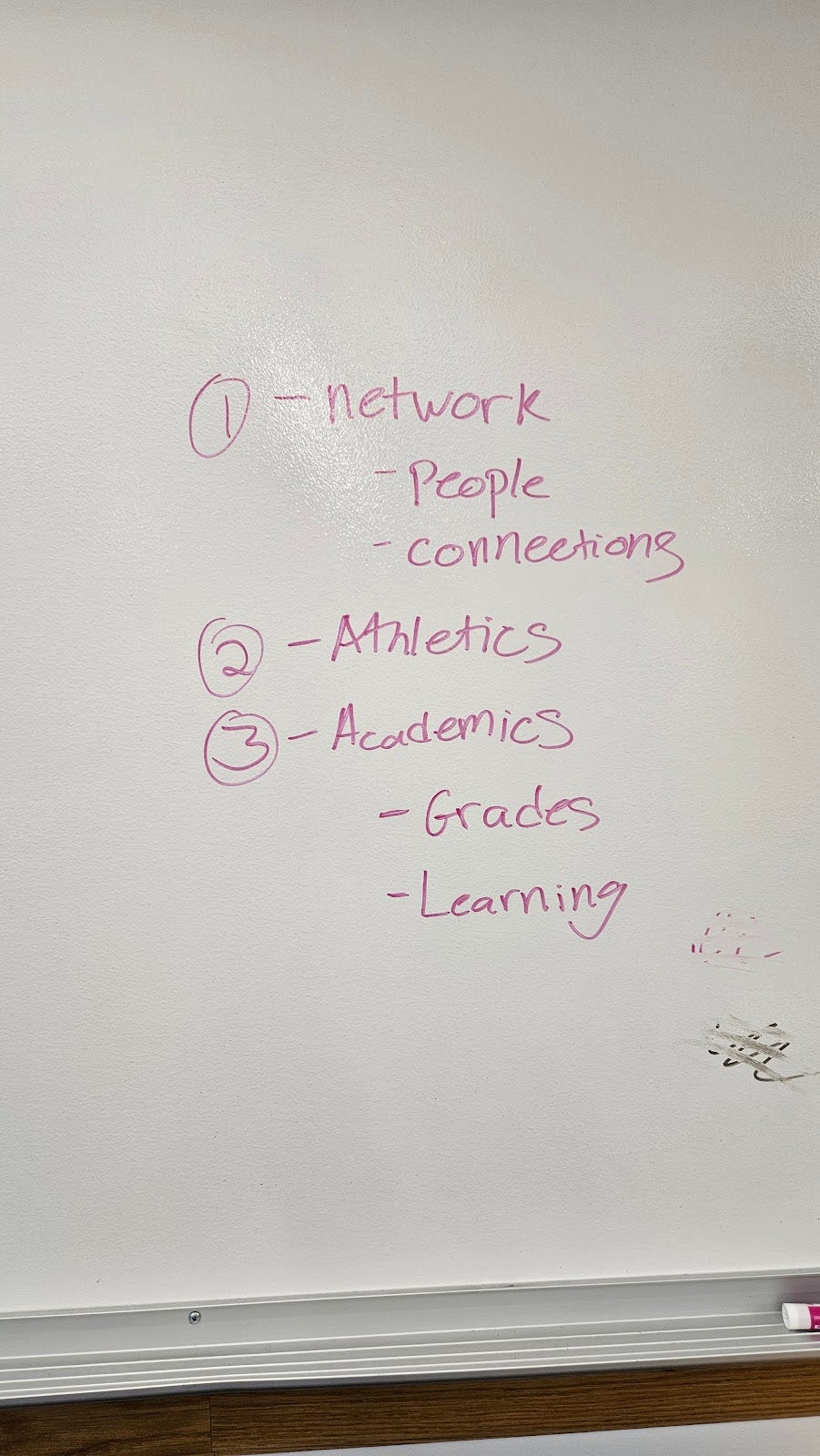This semester I am teaching a course called The Culture of College. I taught it only once before. And while the students are clearly learning quite a lot, I am also deepening my own understanding.
I have been studying higher education for twenty years or so, perhaps a bit longer. My first publication on the topic wasn't until 2009, but I had been having undergraduates interview other undergraduates since about 2004.
I was curious.
Sometimes I was disappointed.
I was often critical, and sometimes cynical, like so many colleagues, of “students these days.”
But over these twenty years, and having written a trilogy of books about higher ed (in addition to My Word, I wrote “I Love Learning; I Hate School": An Anthropology of College in 2016 and Schoolishness in 2024), and having edited a book proposing an alternative approach to pedagogy, Ungrading, in 2020, I am much more critical of the system than of the individuals who show up in my classroom.
The unit we are studying in this class right now is on academics. We have already talked about social life and race/class/gender and drinking and athletics. We've explored different kinds of colleges and universities, including international higher education. We learned about the multiversity and the omniversity.
But now we're talking about the nitty gritty, the supposed core of higher education. In Rebekah Nathan's book My Freshman Year, she talks about the centrality of social life and the role academics play, perhaps as “the price students have to pay” to attend a residential college.
So I asked the students in small groups to generate their own list of the purposes of higher education, ranked. Here are the six lists. (Remember this is a highly selective university. Many of the students in this class are majoring in Business. Quite a few are athletes.)
Group 1
Degree
Connections
Experience/independence
Academics
Social network
Group 2
Network
People
Connections
Athletics
Academics
Group 3
Critical thinking/problem solving
Credentialing
Academics/career building
Increase job opportunities
Networking/social capital
A step towards upward mobility
Character/skill-building/experience
Independence/maturity/resilience
Athletics
Group 4
Network
Academics
Athletics
Development/self discovery
Extracurriculars
Career discernment
Life skills
Social/friends
Fun
Group 5
Academics
Social network
Career connections
Independence
Athletics
Fun experience
Group 6
Academics
Form a network (for post grad)
Knowledge
Social skillset
New perspectives
Independence
Every one of them had academics on the list, though academics was in first place in only two, or possibly three (if "critical thinking” counts as “academics”), of the lists.
Once I saw these lists, I wanted to know what “academics” meant to them, so I asked them to unpack it. It was a confusing mix of outcomes and structures and content.
Group 1
GPA
Learning the material
Expertise
Group 2
Grades
Learning
Group 3
Research
Contributing to the world
Group 4
Classes
Major
GPA
Research
Degree
Group 5
Classes
Grades
Majors
Minors
Knowledge
Learning
Required courses and electives
Exams/group projects
Group 6
Earning a degree
Growing in knowledge
GPA
Alumni
What one learns from these lists is how central a role is played by metrics in higher education. It often seems as if the metrics and the credentials are the primary goal, and learning is an incidental byproduct: nice if you can have it but not really central.
So when faculty issue laments about students who care only about grades or getting through it, who will cut corners to accomplish these extrinsic goals, we have to remember that they have been presented with this system for their entire school life. Pleasing the teacher is a mechanism for a higher grade, because that can get them things they want, whether it is admission to a highly selective university or that first highly paid job after college, or an internship that will help in the credentialing of the student.
In my own courses, which are always ungraded-until-the-end, we really do set aside the game of school as much as possible and place all of our focus on learning. It may look different for every student, but to my mind that is as it should be.
And the students understand the difference.
When I asked them to generate their idea of a dream class, all of them had ungraded classes, with the focus solely on learning.
Far from making me cynical, this has really contributed to my sense of idealism and my sense that the kids are all right. They aren't all right in the sense that they are struggling within the system as it is but they could be all right if the system were otherwise, and they are not so far gone that they can't come back from all-competition-all-the-time.
I recognize my privilege to structure my classes according to my best understanding of how people learn, and thrive. And sometimes I make mistakes. Sometimes the students misunderstand the goals, because they have been socialized to regard a product-for-points as the goal, rather than learning (and so they may not write their own work, just so they can turn something in). But when I explain, and when they experience a setting in which learning is the goal, learning from wherever they are, and together, we can all relax a little, and learn a lot.
I believe in them. I believe in education.
I've become more idealistic, and I realize how very much I need this right now.



